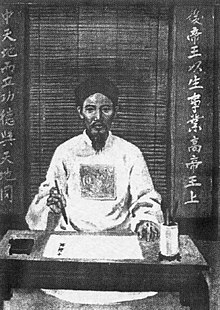Chu Văn An
This articleneeds additional citations forverification.(November 2023) |
| Chu Văn An ChuVănAn | |
|---|---|
 | |
| Vietnamese name | |
| Vietnamese | ChuVănAn |
| Vietnamese Alpha bet | Chu Văn An |
| Hán-Nôm | ChuVănAn |
Chu Văn An(bornChu An,25 August 1292 –c. 1370) was aConfucian,teacher, physician, and high-rankingmandarinof theTrần dynastyinĐại Việt.[1]Hiscourtesy namewas Linh Triệt ( linh triệt ), while hisart namewas Tiều Ẩn ( tiều ẩn ). He was later given theposthumous nameVăn Trinh.
Early life
[edit]He was born in Văn Thôn village, Quang Liệt commune, in present-dayThanh Tridistrict,Hanoi.In the early life, he was famous as a straightforward man who passed the doctoral examination (Thái Học Sinh/ Thái Học sinh ) but refused to become amandarin.Instead, An opened a school and began his career as aConfucianteacher in Huỳnh Cung village in Thanh Tri. An's teaching played an important role in spreading Confucianism into what was at the timeBuddhistVietnam.
Under the reign ofTran Minh Tong(1314–1329), he became a teacher at theimperial academy( Quốc Tử Giám ) where he was responsible for teaching crown prince Vuong, the future emperorTran Hien Tong.Under the reign of emperorTran Du Tong,he became a high-ranking mandarin.

Later, he resigned and return to his home village because Tran Du Tong refused his request of beheading seven other mandarins whom he accused of corruption.[2]For the rest of his life, An continued teaching and wrote books. He died of illness in 1370.
An altar was erected in his honour in theTemple of Literaturein Hanoi, where he is still revered.
Petition to behead corrupt officials
[edit]TheSeven Decapitations Petition( bảy trảm sơ ) was written by Chu Văn An and presented to emperorTrần Dụ Tôngto propose the beheading of seven officials he considered corrupt.
Initially, as Dụ Tông was still a child, his father, emperorTrần Minh Tông,was in charge of the court. After his father died (in 1357), Dụ Tông took charge. However, he was incapable of ruling.
During emperor Trần Dụ Tông's reign, the social situation became disturbing. Dụ Tông loved drinking, having fun with women and music. Officials were incompetent, pampering the emperor so that they could abuse their power. Famine was widespread. Loyal and dutiful subjects were killed. The court's historians, whose job was to dissuade the emperor, tried, but Dụ Tông did not listen.
Chu Văn An was a righteous and straightforward official highly respected at court. The petition was lost, and its contents remain unknown. Even at that time, few people knew who were on his list. Still, the petition shook the country.
See also
[edit]Notes
[edit]- ^Patricia M. Pelley Postcolonial Vietnam: New Histories of the National Past 2002 - Page 125 Chu Văn An
- ^A history of Vietnam: from Hong Bang to Tu Duc,p. 89, atGoogle Books
External links
[edit]![]() Media related toChu Anat Wikimedia Commons
Media related toChu Anat Wikimedia Commons
